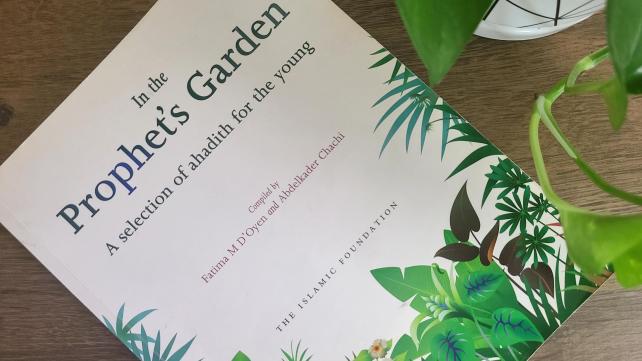
Book Review: In the Prophet’s Garden
By Melissa Barreto
New Jersey
The Prophet Muhammad, peace and blessings be upon him, said:
“Whoever loves my way of life (sunnah) loves me, and whoever loves me will be with me in Paradise.”
(Tirmidhi)
The sciences of hadith are a unique treasure in Islam. As a new Muslim, I felt in awe by the sheer amount of reports and narrations we have preserved about the way the Prophet, peace and blessing be upon him, looked, lived, ate, dressed, spoke, and treated others. Along with the Qur’an, his Sunnah is a primary source for understanding our religion and practicing our faith.
But when it comes to teaching our children about the Sunnah or sharing specific hadith with them, reading directly from collections like Sahih Bukhari or Muslim can feel daunting, especially for the average Muslim who may not have studied hadith before. While these scholarly collections are important and masterfully put together, they were never created for children, and using them with a young person can quickly get overwhelming.
In the Prophet’s Garden , compiled by Fatima M. D’Oyen and Abdelkader Chachi, is a collection of hadith published for use with children, aged 10 and above. In it are 200 ahadith from authentic sources that have been translated into plain English (with the original Arabic printed on top) and clearly organized into overarching themes. The introduction also contains a brief overview of the sciences of hadith and its importance to our deen.
What I like about this book is the condensed formatting. At just under 120 pages, the book is slim and each hadith chosen is short, clear in meaning, and simply cited at the end. This helps make learning and discussing hadith a little more inviting for children and parents than the heftier, classical collections.
The book’s thematic progression is also nice, starting off with hadith related to knowing the Prophet, Islam, and the Qur’an. Then it moves into themes surrounding the pillars of our faith, including prayer, charity, fasting, Hajj, Day of Judgment, Paradise and Hellfire, and repentance. Next, it progresses into a variety of themes relating to character, manners, and how we deal with others which are all important topics for the development of a young Muslim.
What I don’t love about the book is that it is just a compilation of hadith. The book is entirely void of explanations, contextual discussions, or any ideas for parents and families to deepen discussions about the hadith or themes. This keeps the book limited to the reference category, rather than serving as an exciting resource to spend time with.
In the preface, the authors do state they created the book assuming that deeper studies of the hadith would be done under the guidance of a scholar, but they also recommend it as a resource for home, school, or madrasas. If themes are researched and prepared in advance, I can definitely see it coming in handy for a variety of group learning environments.
Overall, the format of this book, and the hadith included make In the Prophet’s Garden a nice addition to the family library but parents should be ready to have deeper discussions with their children.
Melissa Barreto is a home educating mother of five children and the Co-Founder of Wildflower Homeschool Collective, a homeschool organization based in Northern New Jersey.

